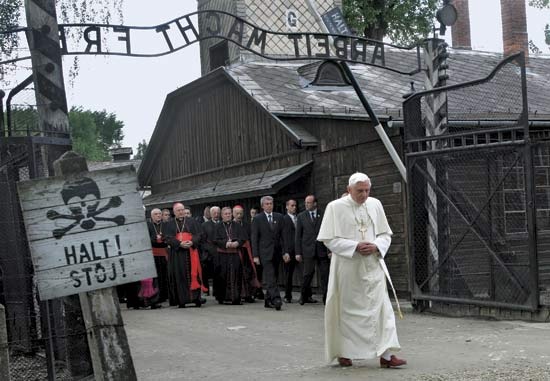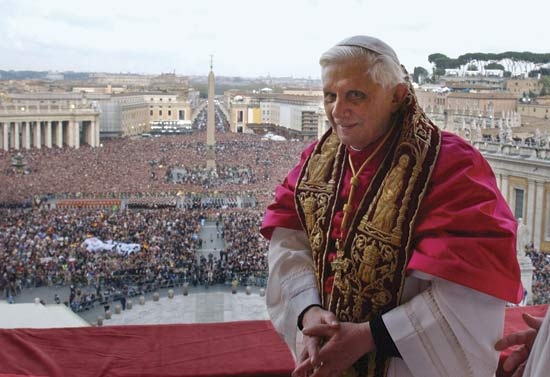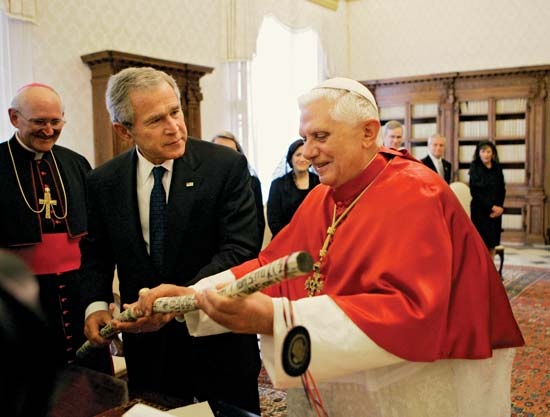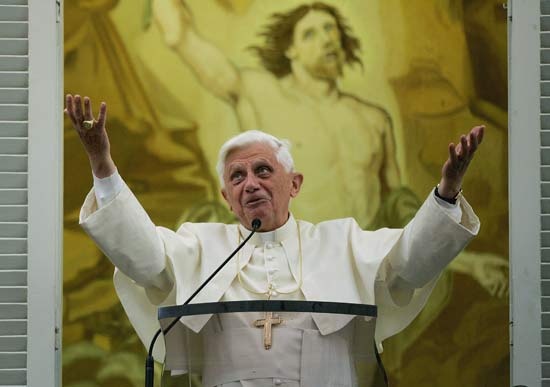Benedict XVI
pope
Introduction
original name Joseph Alois Ratzinger
born April 16, 1927, Marktl am Inn, Ger.
the bishop of Rome and the head of the Roman Catholic Church from 2005. Prior to his election as pope, Benedict led a distinguished career as a theologian and as prefect of the Congregation for the Doctrine of the Faith. His papacy faced several challenges, including a decline in vocations and church attendance, divisive debates concerning the direction of the church, and the lingering effects of the scandal of the late 1990s and early 2000s surrounding the church's handling of numerous cases of sexual abuse by priests.
Early life and career
Ratzinger's father was a policeman and his mother a hotel cook. The youngest of three children, Ratzinger was six years old when the Nazis took power in Germany in 1933; his parents, who were staunch Catholics, were hostile to the regime. Ratzinger entered the seminary in 1939. In 1941 he was compelled to join the Hitler Youth, and in 1943 he was drafted into the German military, serving in an antiaircraft unit in Bavaria before being sent to Hungary to set tank traps in 1945. He deserted in April of that year and was captured by American forces and held prisoner for a brief period.
After the war, Ratzinger continued his education in the seminary; he was ordained a priest in June 1951. In 1953 he was awarded a doctorate in theology at the University of Munich. After earning his teaching license in 1957, he taught dogma and theology at the higher school of philosophy and theology in Freising until 1959, later moving to the University of Bonn (1959–69) and also teaching at universities in Münster (1963–66) and—at the invitation of the theologian Hans Küng (Küng, Hans)—Tübingen (1966–69). In 1969 he moved to the University of Regensburg, where he later became vice president.
During his long academic career, Ratzinger wrote a number of important theological works, including Introduction to Christianity (1968) and Dogma and Revelation (1973). His work in theology attracted the attention of the archbishop of Cologne, Joseph Frings, who asked Ratzinger to serve as his expert assistant at the Second Vatican Council (Vatican Council, Second) (1962–65). One of the more progressive figures at the council, Ratzinger opposed those who hoped to limit reform. He contributed to a document that severely criticized the Sacred Congregation of the Holy Office and that eventually led to its reorganization by Pope Paul VI (1963–78) as the Congregation for the Doctrine of the Faith. Ratzinger's university years, however, brought about a transformation of his views. The student protests and denunciations of Christianity that he witnessed while teaching at Tübingen reminded him of the tactics of the Nazis and gradually led him to adopt a more conservative theological perspective.
In March 1977 Ratzinger was appointed archbishop of Munich by Paul VI, who bestowed the cardinal's hat on him three months later. On Nov. 25, 1981, he was made prefect of the Congregation for the Doctrine of the Faith by his friend Pope John Paul II (1978–2005), whom he had known well since 1977. The pope and his prefect shared a similar history, both having lived under totalitarian regimes, and their views concerning the church were substantially the same. For more than two decades, Ratzinger was the pope's closest adviser.
As prefect of the Congregation for the Doctrine of the Faith, Ratzinger earned a reputation as a hard-line enforcer of doctrinal uniformity. He condemned liberation theology and suppressed more-liberal theologians such as the Brazilian Leonardo Boff and the American Charles Curran. Despite his reputation, even his harshest critics recognized his intelligence and his ability to discuss controversial matters in an objective and disinterested spirit. He was also recognized for his humility and gentleness as well as for his many talents; he spoke several languages and was an accomplished pianist, with a particular fondness for Mozart. Although Ratzinger insisted on the superiority of the Catholic faith to other religions, which he deemed insufficient as means to salvation, he was also closely involved in John Paul's historic efforts to reach out to other faiths, especially Judaism and Islam (Islām).
Election as pope

 Ratzinger's election as pope on the second day of the conclave was something of a surprise because of his status as a leading candidate; front-runners are almost never chosen, a fact reflected in the popular expression, “He who enters as a pope leaves as a cardinal.” His position with the cardinal electors was apparently secured by his long service to John Paul and his devotion to his predecessor's teachings and ideals. The homily he delivered as part of the funeral proceedings for the pope also increased his stature. Although he said he had prayed not to be chosen, Ratzinger humbly accepted his election on April 19, 2005, becoming at age 78 the oldest newly elected pope since Clement XII (1730–40). His choice of the name Benedict XVI recalled St. Benedict of Nursia (Benedict of Nursia, Saint), the patron saint of Europe and the founder of Western monasticism, as well as earlier popes of the same name, including Benedict XV (1914–22), who sought to mediate between the belligerents during World War I. Benedict XVI immediately took steps to continue John Paul's dialogue with Judaism and Islam (Islām) and with other Christian churches. Further, he declared that one of the goals of his papacy would be to revitalize the Catholic church in Europe. Benedict also indicated that he would maintain his predecessor's conservative orthodoxy on matters of sexuality, priestly celibacy, and ecclesiastical organization.
Ratzinger's election as pope on the second day of the conclave was something of a surprise because of his status as a leading candidate; front-runners are almost never chosen, a fact reflected in the popular expression, “He who enters as a pope leaves as a cardinal.” His position with the cardinal electors was apparently secured by his long service to John Paul and his devotion to his predecessor's teachings and ideals. The homily he delivered as part of the funeral proceedings for the pope also increased his stature. Although he said he had prayed not to be chosen, Ratzinger humbly accepted his election on April 19, 2005, becoming at age 78 the oldest newly elected pope since Clement XII (1730–40). His choice of the name Benedict XVI recalled St. Benedict of Nursia (Benedict of Nursia, Saint), the patron saint of Europe and the founder of Western monasticism, as well as earlier popes of the same name, including Benedict XV (1914–22), who sought to mediate between the belligerents during World War I. Benedict XVI immediately took steps to continue John Paul's dialogue with Judaism and Islam (Islām) and with other Christian churches. Further, he declared that one of the goals of his papacy would be to revitalize the Catholic church in Europe. Benedict also indicated that he would maintain his predecessor's conservative orthodoxy on matters of sexuality, priestly celibacy, and ecclesiastical organization.

 During the early years of his papacy, Benedict visited several countries, including Turkey, where he met the ecumenical patriarch of Constantinople in the hope of improving relations between the Roman Catholic and Eastern Orthodox (Eastern Orthodoxy) churches. He issued new guidelines allowing greater use of the Latin mass—the order of the mass used before the reforms of the Second Vatican Council—and he published the encyclicals Deus caritas est (2005; “God Is Love”) and Spe salvi (2007; “Saved by Hope”). In 2007 Benedict approved the decisions of the International Theological Commission, an advisory panel to the Vatican, that the traditional teaching of limbo was “unduly restrictive” and that unbaptized infants could be saved. He made his first trip to the Western Hemisphere, visiting Brazil, where he canonized Father Antonio Galvão (1739–1822), the first native-born Brazilian saint. He also overturned John Paul's reform of the papal election process and restored the traditional practice when he declared that the election of a new pope requires a two-thirds majority of the cardinals attending the conclave. In 2008 Benedict made his first visit as pope to the United States, where he spoke out against clerical sexual abuse and delivered an address at the United Nations. Later that year he addressed the first Catholic-Muslim Forum, a three-day conference of Catholic theologians and Islamic scholars hosted by the Vatican to promote improved understanding between the two religions. In January 2009 Benedict revoked the excommunications of four bishops who in 1988, without papal sanction, had been consecrated by Marcel Lefebvre (Lefebvre, Marcel) (1905–91), an ultraconservative French archbishop who was excommunicated with them.
During the early years of his papacy, Benedict visited several countries, including Turkey, where he met the ecumenical patriarch of Constantinople in the hope of improving relations between the Roman Catholic and Eastern Orthodox (Eastern Orthodoxy) churches. He issued new guidelines allowing greater use of the Latin mass—the order of the mass used before the reforms of the Second Vatican Council—and he published the encyclicals Deus caritas est (2005; “God Is Love”) and Spe salvi (2007; “Saved by Hope”). In 2007 Benedict approved the decisions of the International Theological Commission, an advisory panel to the Vatican, that the traditional teaching of limbo was “unduly restrictive” and that unbaptized infants could be saved. He made his first trip to the Western Hemisphere, visiting Brazil, where he canonized Father Antonio Galvão (1739–1822), the first native-born Brazilian saint. He also overturned John Paul's reform of the papal election process and restored the traditional practice when he declared that the election of a new pope requires a two-thirds majority of the cardinals attending the conclave. In 2008 Benedict made his first visit as pope to the United States, where he spoke out against clerical sexual abuse and delivered an address at the United Nations. Later that year he addressed the first Catholic-Muslim Forum, a three-day conference of Catholic theologians and Islamic scholars hosted by the Vatican to promote improved understanding between the two religions. In January 2009 Benedict revoked the excommunications of four bishops who in 1988, without papal sanction, had been consecrated by Marcel Lefebvre (Lefebvre, Marcel) (1905–91), an ultraconservative French archbishop who was excommunicated with them.- gentian
- Gentianaceae
- Gentianales
- Gentile Bellini
- Gentile da Fabriano
- Gentile, Giovanni
- Gentileschi, Artemisia
- Gentileschi, Orazio
- Gentili, Alberico
- Gentil, Émile
- Gentleman's Magazine
- Gentlemen's Agreement
- Gentofte
- Gentry, Charter to the
- Gentz, Friedrich
- genus
- Genève
- Genée, Dame Adeline
- geocentric system
- Geochemical balance of some elements in seawater
- geochemical cycle
- geochemistry
- geochronology
- geode
- geodesic dome